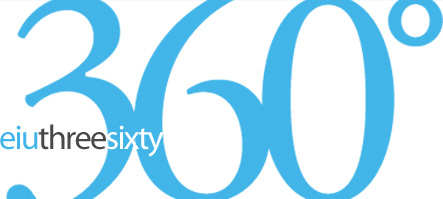Poverty and hunger are a very real problem in Coles County and the surrounding area. In fact, you might not realize just how widespread these issues are in east-central Illinois; Michael Gillespie certainly didn’t know it when he took a job in EIU’s Department of Sociology back in 2010.
Since then, however, Dr. Gillespie has fully immersed himself in not only identifying and researching poverty and food insecurity within the 14-county region served by the Eastern Illinois Food Bank, but also becoming active in the fight against them and encouraging Eastern students to do the same.
“I look at the geographic distribution of where poverty is within the counties that are serviced by the food bank,” said Gillespie, explaining his research efforts. “The reason I use the food bank is because it makes for a nice comparison between different size counties. It allows for a nice dynamic to be able to compare the data between different size places within a geographic region.”
Despite a long-standing interest in poverty issues and other equality-related matters dating back to his undergrad days at the University of Michigan-Dearborn, Gillespie says his decision to come to Charleston wasn’t actually influenced by the area’s demographics.
“I started fishing around (for poverty data) and I couldn't find anything,” remembers Gillespie of researching the area prior to his arrival at EIU. “When I came down here, I still couldn't dig anything up. I started asking around, and no one was collecting this information, and so that's sort of how I got started. I figured someone had to do it, and why not me?”
It was the beginning of the Coles County Poverty Data Project, a blog Gillespie developed and maintains. The purpose and goals of the project are stated on the site’s “About” page, but the gist is that it exists to collect and disseminate poverty data from within the county and region in hopes that the right people will utilize it to make a positive change.
“I’ve consulted and I have worked with several different organizations within the county and within the region,” said Gillespie. “(The blog) gives them immediate access to some quick numbers if they are writing grants, or they need to go give a speech, or they need to utilize that information somehow for their own work.
"It became sort of a two-fold thing: A creative way to get information out there, but also a way to access and use data, which I found difficult to do when I moved down here.”
As an assistant professor in the sociology department, Gillespie also finds plenty of opportunity to use this research in the classroom.
“There’s a really nice crossover,” said Gillespie. “It's stuff that I do that fulfills me to be able to give back to the community -- sort of a skill that I have and a trait that I have -- but also then bring that into the classroom, and hopefully inspire other students to go off and do similar things.
“It gives them a way to see how it's played out in the real world, so they can see, they can take it in, and then as maybe an avenue for them to explore in grad school, or in employment, or something for that.”
Those interactions with students aren’t limited to classroom settings, either.
“I haven't had a chance to get students involved directly within the research aspect, but what I've done is I've worked with Rachel Fisher in the Student Community Service office and we have come up with a student organization called the Hunger Action Team,” said Gillespie.
“What the Hunger Action Team exists to do is to educate and be activists about issues of poverty and hunger, not only in our community, but around the state, around the country, and around the world.”
The Hunger Action Team gets students out in the field, raising money, scheduling speakers, and getting active in local organizations so they can get a first-hand grasp on the issues at hand.
“Hopefully they’ll get inspired to do something about it while they are here at Eastern or after they leave,” said Gillespie, who went on to explain that November is Hunger Action Month. “Every day of the month is something different related to issues of poverty, or related to issues of hunger, either within the community, or somewhere around the country, somewhere around the state.
This year, we have guest speakers coming in, we have food carts that we put out on Thursdays around campus so people who are walking around can get a meal, and all the money that is made there goes back to local organizations. We do food drives, we do in-kind donation drives for things like toiletries. We are always looking for ways to get students involved in being service persons, in being activists, and being inspired to move forward with these issues.”









